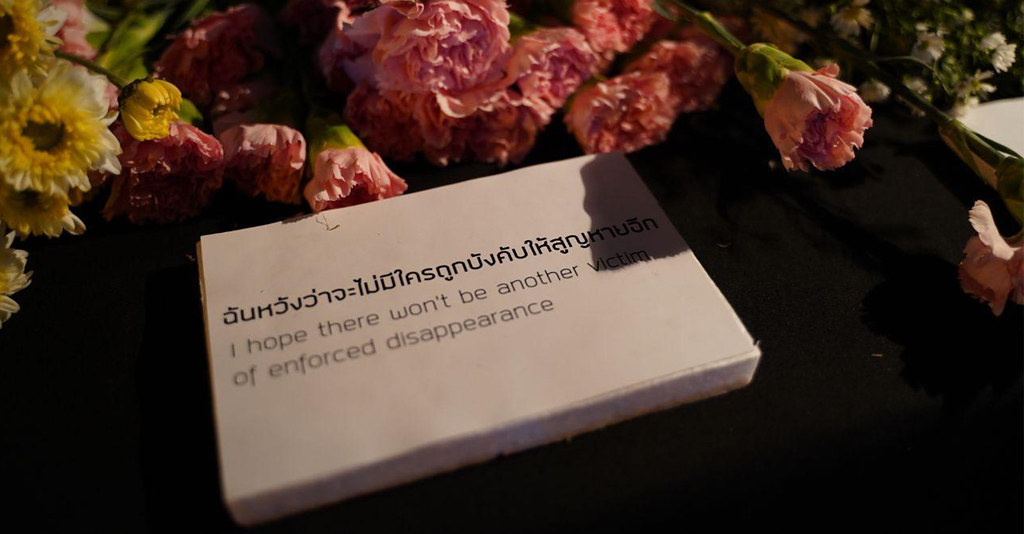The Cabinet has decided to postpone the enforcement of several sections in the new Prevention of Torture and Enforced Disappearance Act requiring police officers to make audio and video recordings from the moment of arrest through to release, claiming the need for training and equipment.

A rally placard toward ending enforced disappearance. (File photo)
Ratchada Thanadirek, Deputy Spokesperson to the Office of the Prime Minister, said on Tuesday (14 February) that the Cabinet has issued an Emergency Decree postponing the enforcement of Sections 22 – 25 in the new Prevention of Torture and Enforced Disappearance Act until 1 October.
These sections require police officers to make continuous video and audio recordings of an arrest from the moment of arrest through to release or until the detainee is handed over to an inquiry officer. They must also record information about the detainee, including personal information and the manner of their arrest, and must allow family members, lawyers, or official commissions to access the information unless releasing the information would violate the person’s privacy, cause them harm, or obstruct a criminal investigation.
If officers refuse to release information about a detainee, the person asking for access may file for a court order for the release of information on the grounds that they suspect torture, inhuman treatment, or enforced disappearance has occurred.
Ratchada said that the Cabinet decided to postpone the Act’s enforcement because relevant government agencies, such as the police headquarters, the Department of Land Transport, the Department of Special Investigation and the Office of the Narcotics Control Board, are still working on fulfilling the requirements. The Cabinet ruled that the enforcement of these sections should be postponed to allow officers to prepare to fulfil the requirements and prevent them from being accused of unlawful arrest.
She said that they are still in the process of purchasing police body and vehicle cameras, detention room cameras, and setting up an online system for storing data. They also need time to train officers to use the recording equipment.
The Prevention of Torture and Enforced Disappearance Act was passed in August 2022. It was implemented on 24 October 2022 when it was published in the Royal Gazette with the provision that it would be enforced after 120 days, or on 22 February 2023.
The police have previously sought to delay the enforcement of the Prevention of Torture and Enforced Disappearance Act, claiming that they were not ready. In January 2023, a letter to the Ministry of Justice signed by police chief Pol Gen Damrongsak Kittiprapas was released claiming that the police have yet to purchase the equipment needed to fulfil the act’s recording requirements, including body and vehicle cameras, and that they need time to train officers to use the equipment.
The letter also said that the police found the law lacks concrete guidelines, which are to be established after the formation of the Commission on the Prevention and Suppression of Torture and Enforced Disappearance, an entity to be set up under this law.
Ahead of yesterday’s Cabinet meeting, the Cross-Cultural Foundation (CrCF) published an open letter opposing the delay of the Act’s enforcement, raising concerns about the police’s attempt to delay the enforcement of a key piece of legislation protecting people from serious human rights violations at the hand of the authorities. It also said that the CrCF finds the police’s excuses to be “unfounded and unreasonable” and “far from urgent” as they have had time to prepare its personnel and equipment since 2021.
The CrCF also said that the attempt to seek the Act’s deferral shows that the government is unwilling to comply with Thailand’s international obligations and that the government is going against the public’s demand for a law eliminating torture and other cruel, inhuman or degrading treatment and enforced disappearance.
CrCF representatives and other activists also went to parliament on Tuesday morning to submit the open letter. Pornpen Khongkachonkiet, CrCF director, told The Reporters that there is no justification for the Cabinet to rush to issue an Emergency Decree postponing the enforcement of legislation that was to be enforced in around 10 days. She said that the Prevention of Torture and Enforced Disappearance Act would protect people and prevent unlawful treatment by officers, and raised the concern that the act will never be enforced if parliament is dissolved.
Pornpen believes that the reason for the postponement was not budgeting or the need to train personnel, but because of a provision in the act that commanders of any offending agency will be punished for any act of torture or enforced disappearance.
Justice Minister Somsak Thepsuthin told The Reporters that the Emergency Decree has to first be approved by the King and then published in the Royal Gazette for it to be effective. The police will then have 7 months to purchase equipment and train officers.
Prachatai English is an independent, non-profit news outlet committed to covering underreported issues in Thailand, especially about democratization and human rights, despite pressure from the authorities. Your support will ensure that we stay a professional media source and be able to meet the challenges and deliver in-depth reporting.
• Simple steps to support Prachatai English
1. Bank transfer to account “โครงการหนังสือพิมพ์อินเทอร์เน็ต ประชาไท” or “Prachatai Online Newspaper” 091-0-21689-4, Krungthai Bank
2. Or, Transfer money via Paypal, to e-mail address: [email protected], please leave a comment on the transaction as “For Prachatai English”
